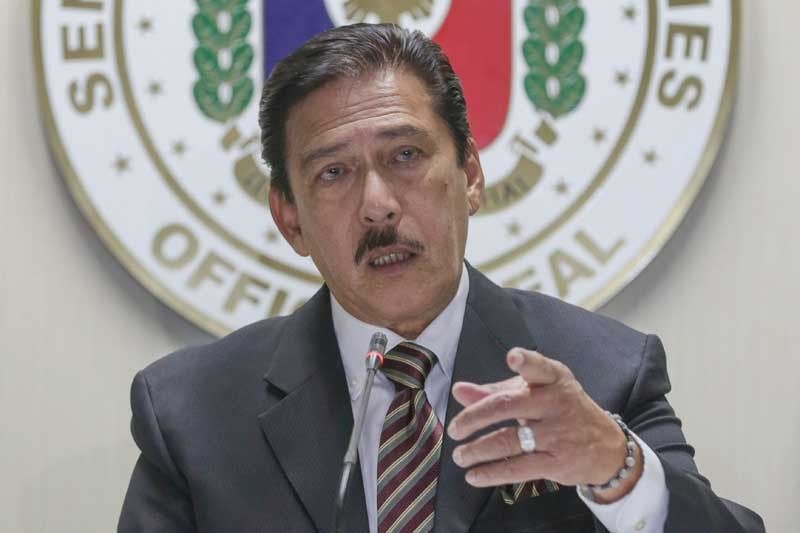Tito Sotto blames Palace exec for series of vetoes

MANILA, Philippines — It’s the failure of the Presidential Legislative Liaison Office (PLLO) to coordinate with Congress that led to President Duterte’s vetoing several priority bills in the past several days, including the Coco Levy Fund Bill, Senate President Vicente Sotto III said yesterday.
“This is again another testament that we need to revitalize or even upgrade the PLLO. This is the nth time that we do not know what the executive department wants from us,” Sotto told reporters when asked about the vetoed measures.
Vetoed recently by the President, aside from the Coco Levy Fund Bill, are the measure reconstituting the Philippine Coconut Authority (PCA) and the Tax Amnesty Bill, all priorities of the administration.
“Like all the other bills vetoed, we could have addressed the provisions that the executive department does not want to execute,” he said.
Sotto said the legislative branch does not “consult a crystal ball” to determine the provisions Malacañang wants included in bills it wants passed.
He said the failure of the PLLO, headed by Secretary Adelino Sitoy, to do its job led to waste of time and money in the process of passing legislation.
When asked if Sitoy should be fired, Sotto did not answer.
It was not the first time the PLLO chief was subjected to the same criticisms. Last year, lawmakers chided him also for not coordinating with the legislature on the coco levy bill, which seeks the establishment of a P100-billion trust fund for coconut farmers.
Congress, however, has allocated P5 million to the PLLO for its computerization program this year.
Presidential spokesman Salvador Panelo meanwhile said Sotto should not blame Sitoy for the vetoed bills.
“You know, the PLLO will just say ‘these are the measures that the president wants.’ But you cannot also deprive Congress of independently assessing or evaluating the wisdom, the need of a particular legislation,” Panelo said.
“If they think they do not like the entire measure, they could change it. That’s their right. That’s part of democratic process,” he added.
Coco trust fund veto
The President has vetoed a bill that would have created a trust fund for coconut farmers and the coconut industry, saying it might violate the Constitution.
In his veto message dated Feb. 14, Duterte said the bill does not reflect the ultimate goal of accelerating the full use of Coco Levy assets and funds to benefit marginalized coconut farmers.
Sen. Cynthia Villar, principal author and sponsor of the Coco Levy bill, vowed to re-file the measure in the next Congress even as she expressed sadness over its being vetoed by Malacañang.
Villar said the vetoed measure was meant to allow 3.5 million coconut farmers and their beneficiaries to directly benefit from the P100- billion coconut levy fund.
“Don’t be sad. Rest assured that as soon as I go back to Congress in July, we will re-file the bill,” Villar told coconut farmers during a recent visit to Laguna.
Vice President Leni Robredo and opposition senatorial bet Florin Hilbay lamented Duterte’s decision to veto the Coco Levy Fund Bill.
“We all know that whatever the President wants to be passed, Congress will abide. There are several measures passed by Congress in the past because the President is in favor of these. That’s why we were surprised this happened with the coco levy (bill),” Robredo said in Filipino.
The Vice President had served as pro-bono lawyer for farmer groups before entering politics.
Robredo, a former Camarines Sur representative, was one of the principal authors of the Coco Levy Fund during the 16th Congress.
Duterte said yesterday he vetoed the coco levy fund bill because it lacked “vital safeguards” to avoid past mistakes and “may be violative of the Constitution.”
For his part, Hilbay, one of the candidates of the opposition Otso Diretso (Straight Eight) slate, said the veto was a setback for justice.
“Justice delayed is justice denied,” he said.
“There’s a greater risk that after a very long process, we will have elections and there will be new members of Congress who might have different views, opinion (on coco levy fund). The justice that our coconut farmers have been waiting for would be delayed again,” Hilbay said.
Malacañang reportedly disagreed with the provision designating six farmer-representatives in the state-run Philippine Coconut Authority Board compared to only five government representatives.
Robredo said they had pushed for the inclusion of more farmer representatives in the PCA board because “if there are people who are interested in protecting the funds, these are the farmers. Because this is for them.”
Meanwhile, Sen. Joseph Victor Ejercito, chairman of the committee on health, thanked Duterte for signing into law the National Integrated Cancer Control Act measure, now Republic Act 11215, of which he is a principal author.
“I am very thankful for this very heartwarming and very affectionate ‘gift’ by the President to cancer patients and their families and to the people,” he said in a statement. – With Helen Flores, Alexis Romero
- Latest
- Trending


























